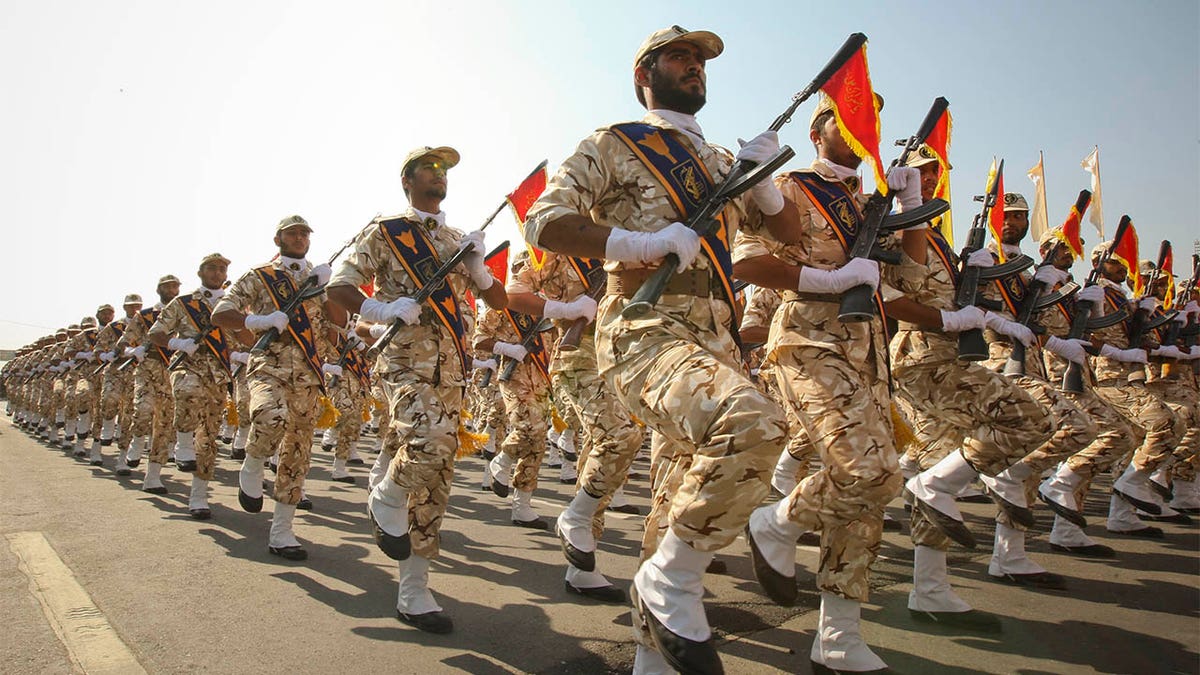Fox News Flash top headlines for October 19
Fox News Flash top headlines are here. Check out what's clicking on Foxnews.com.
Despite staunch opposition from the United States, a long-standing UN arms embargo has lapsed – leaving Tehran open to deadly weapons purchases.
Celebrations erupted through the upper echelons of Tehran's ruling class this weekend, as a 13-year arms embargo against the religious regime expired on Sunday – marking a "momentous day" for the government and a concerning one for its adversaries and observers of regional stability.
So what happens now?
Under the embargo, which came into effect in 2007, the export of "certain conventional arms to Iran" and the "procurement of any arms or related materiel from Iran" was cemented as a violation of the UN Security Council resolution and remained subject to sanctions.
Yet, the UN adamantly rejected an appeal from the U.S. in August to extend the blockade. China and Russia, permanent members of the Security Council, swiftly voted against it. Adding to the Washington blow was that allies France, Germany and Britain, all abstained. The only supporter of the U.S. initiative was the Dominic Republic.

Iran and United States flags together realtions textile cloth fabric texture
The expiration frees Tehran to buy and sell conventional weapons – such as missiles, tanks, and fighter jets – and it will face no obstacles from the UN Security Council.
IRAN SENTENCES 3 MORE MEN TO AMPUTATION FOR 'STEALING,' REVIVING ONCE-RARE ISLAMIC LAW
"In legal terms, it means that Iran can now freely buy and sell arms," surmised Hooman Mirghasemi, a journalist at the London-based Iran International TV. "Iran's president, Hasan Rouhani, has called it a great victory. The legal aspect, however, is undermined by the United States' unilateral approach towards Iran's potential customers."
But considering the scope of the United States' influence, he continued, it is very unlikely that Iran can sell arms to countries or entities that have some form of ties with the United States.
"The same goes for obtaining weapons from such countries," Mirghasemi said.
In the weeks leading up to the lapse and on the day it officially ended, U.S. officials were doubling-down on their "maximum pressure" campaign, cautioning that Iran will further destabilize the already burned and bloodied region, and spurn further proxy wars already enduring in the likes of Yemen, Iraq and Syria.
On Sunday, U.S. Secretary of State Mike Pompeo issued a stark word of warning to anyone endeavoring to do arms deals with Iran.
"For the past 10 years, countries have refrained from selling weapons to Iran under various UN measures. Any country that now challenges this prohibition will be very clearly choosing to fuel conflict and tension over promoting peace and security," Pompeo said in a statement. "Any nation that sells weapons to Iran is impoverishing the Iranian people by enabling the regime's diversion of funds away from the people and toward the regime's military aims."
Last month, the U.S. moved to unilaterally re-impose a "snapback process" to reinstate the entire bevy of sanctions leveled against Iran before the 2015 JCPOA, better known as the Obama administration's "Iran Deal," was inked. Other parties to the agreement have pushed back against Washington because they have argued that the United States relinquished any authority in the agreement when Trump administration withdrew in May 2018.

Members of the Iranian revolutionary guard march during a parade to commemorate the anniversary of the Iran-Iraq war (1980-88), in Tehran September 22, 2011. REUTERS/Stringer
Behnam Ben Taleblu, a senior fellow from the Foundation for Defense of Democracies, said that the snapback is fail-safe – for now.
"Washington will need to make sure that it has partners in jurisdictions that Iran likes to go shopping in to thwart purchases, while also developing the proper legal argumentation to make interdictions of transfers if needed," he said. "Iran wants a freer hand to export weapons to partners and proxies, as well as to procure select systems and component parts to make its asymmetric military machine into more of a lethal and hybrid force, not a purely conventional one."
And for now, Tehran is putting on a bold and measured face. The country's defense minister, Amir Hatami, vowed during a Sunday evening television interview that they won't sell to countries that would "misuse" deadly arms, and would deploy weapons "strictly for defense purposes."
And despite the U.S. rhetoric, Tehran could soon have some suitors at the table.
For one, Russia's ambassador to the country, Levan Jagarian, affirmed earlier this month that he would have "no problem" selling the air defense systems. Discussions over deepening their military cooperation, which solidified throughout the long-running Syrian Civil War because Moscow and Tehran provided critical lifelines to the embattled Assad regime, have gone on since the summer of 2019.
CUBA, CHINA, RUSSIA ELECTED TO UN HUMAN RIGHTS COUNCIL; US BRANDS IT A 'MOCKERY'
Russian officials had said that they were open to selling the S-400 to Iran, which came as tensions between Tehran and Washington were fast escalating, and many feared a U.S. strike could be imminent, but at that point, Russia had not received an official request.
Russian Foreign Minister Sergei Lavrov has made it clear in past statements that come the end of next week; there would be no limitations whatsoever on arms supplies to and from Iran.
The S-400 is largely deemed one of the most effective air-defense systems in operation and can engage targets at a distance of 250 miles and from altitudes of more than 98,000 feet. It first became operational by Russian forces in 2007.
But foreign policy experts underscore Russia is hardly alone.
"Russia and China are speculated as potential sellers of arms to Iran. Again, Iran's income from oil is at an all-time low because of Donald Trump's maximum pressure policy. On the other hand, because of this policy, Iran's central bank's assets are frozen in other countries, and consequently, Iran does not have access to sufficient funds for such purchases," Mirghasemi said. "However, as an act of defiance, the possibility of arms purchased from China or Russia, even very limited, is not entirely unlikely."
According to Brett Bruen, a former U.S. diplomat who served as director of global engagement at the White House, there are a number of countries and companies that are already subject to American sanctions, including Russia and North Korea, who will not be fazed by the threats from the Trump administration.
Some of them have off the books deals that can now be done more publicly," he said.
But for many players, it's a delicate web of enemies and friends.
"China already has major arms contracts with Saudi Arabia and the UAE that could be undermined if it alienates those countries with major arms sales to Iran," noted Jim Phillips, a senior research fellow for Middle Eastern affairs at The Heritage Foundation. "It is likely that Tehran will want to buy a lot more weapons than China will be willing to sell."
He also stressed that U.S. sanctions would continue to inhibit Iranian arms imports and exports.
"Any companies that sell arms or buy arms from Iran can expect strong sanctions from Washington," Phillips continued. "Iran especially seeks to buy advanced weapons from Russia and China, but those arms imports are likely to be constrained by U.S. financial sanctions and push back from Washington, as well as from regional states threatened by Iran."
The lapsing isn't only a steep cause for U.S. concerns, but also for Iran's chief target and neighbor – Israel.
"Without the arms embargo, it will be urgent for Israel to unite a group of countries to press Russia not to sell Iran the SU-30 and the S-400," the Jerusalem Post warned on Monday. "Israel will also need to start contingency planning for how to combat the SU-30 in Syria and elsewhere to maintain security on its borders and for how to overcome the S-400, should the need to preemptively strike any Iranian nuclear facilities emerge."
CLICK HERE TO GET THE FOX NEWS APP
Nonetheless, the biggest win for Tehran may not be in the way of weapons or battlefield triumphs anytime soon, but in its bid to win sympathy, solace, and support on an international stage.
"This is a big propaganda victory for Iran. They will take advantage of the opportunity to highlight Washington's isolation, even as their diplomatic victories pile up," Bruen added.


